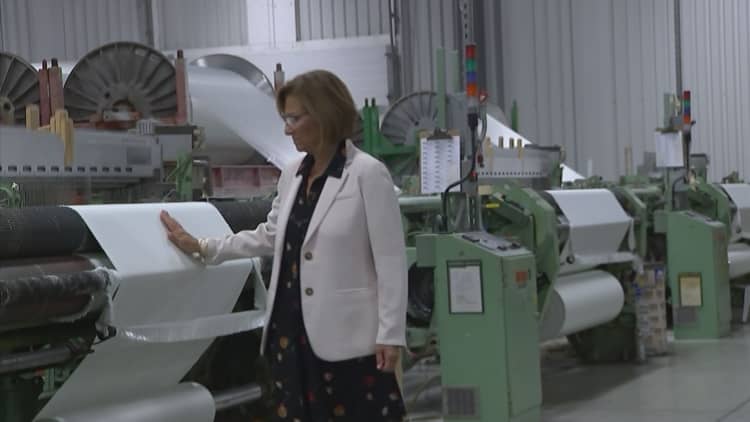
Since 1979, Kathie Leonard has run Auburn Manufacturing, a small company that makes heat and fire-resistant fabrics for industrial use. Leonard has two facilities in Maine, selling to heavy industry businesses in oil, petroleum, shipbuilding, and even the U.S. Navy.
About four years ago, Leonard began losing sizeable contracts. In fact, she watched about 30 percent of her business in silica fabrics disappear. She began to investigate why, and came to find out a similar product was being imported from China and sold to her competitors for up to 30 percent less than Auburn's price.
"It was hard to believe somebody could just undercut us so easily," Leonard said. "We got to the point where we had to either give up this product line, or we look into filing an anti-dumping case. We're a manufacturer, I didn't want to become a distributor—that's a different business model. I worked hard for years building this business."
President Trump has pointed to companies both large and small to justify placing tariffs on China and other trade partners, saying current deals are harmful to the economy. On Friday, the White House unveiled 25 percent tariffs on up to $50 billion in Chinese goods, a move met with swift backlash from Beijing.
Leonard maintains she is one of many small companies being harmed by unfair trade practices.
She decided to hire counsel from Drinker, Biddle & Reath, a Philadelphia-based law firm experienced in trade matters to do a feasibility study, which took three months. The company had already let go ten employees due to dumping, about 20 percent of its workforce.
"It turned out we were right—we were able to prove how much we'd lost and were able to identify the major players in the market," Leonard said. "And with those facts, we said, 'We've got to do something.'"
Leonard filed an anti-dumping case with the Department of Commerce. Eighteen months and nearly $1 million later, the DOC ruled in Auburn Manufacturing's favor, placing an import duty of between 200 and 300 percent on that same silica fabric her competitors were buying from China.
"I felt ebullient, for a moment, and then grateful it was over. And then, I moved on quickly to being sort of wary about the future. Because it doesn't mean you win, and all of a sudden you get all your market back and make more money," she said.
In fact, the business is still feeling the impacts of Chinese dumping, despite hiring back several workers and regaining some market share.
"A lot of Chinese fabric had been imported. So I can assume there will be plenty of material on the floor in warehouses in the United States for a long time to come," she said. "The folks who left [the company] aren't the ones who come back—it really does hurt a company like ours in that we have to find new people and train them to do these jobs"
As for President Trump's trade policies and facing off with other nations, Leonard said she's been enjoying the back and forth. Though the small business owner did not support Trump in the election, she's encouraged by the way free trade agreements are being addressed by the administration.
"I think what's happened here is that there's a lot of American interest in offshoring and outsourcing, companies tend to look the other way when it comes to buying from China, because if they can make money easier than making it here, why not?" she said. "I'm interested in watching [trade negotiations] and I think the concept is correct. If we had dealt with China's cheating all along, incrementally, we might not be in this mess."


